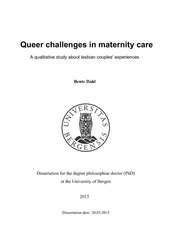| dc.contributor.author | Dahl, Bente | en_US |
| dc.date.accessioned | 2015-03-24T10:09:54Z | |
| dc.date.available | 2015-03-24T10:09:54Z | |
| dc.date.issued | 2015-03-20 | eng |
| dc.identifier.isbn | 978-82-308-2681-2 | en_US |
| dc.identifier.uri | https://hdl.handle.net/1956/9621 | |
| dc.description.abstract | The number of lesbian women opting for motherhood is increasing, implying that healthcare providers are likely to encounter lesbian couples in all maternity care contexts. Although an increasing proportion of the Norwegian population is comfortable with same-sex marriage, a certain scepticism remains regarding lesbian motherhood and altered family structures. As motherhood is still strongly associated with heterosexuality, these encounters may be challenging. In my thesis I aim to develop knowledge about lesbian women’s maternity care experiences as a foundation for adequate maternity care for lesbian couples. For this purpose, three sub-studies were accomplished. In sub-study I, we explored midwives’ experiences from encounters with lesbian women and their partners. Interview data from eleven midwives were analyzed by a phenomenological-hermeneutical method. According to the midwives, lesbian couples were open about their sexual orientation and relationship to maternity care staff. Midwives felt that lesbian couples would have a specific bodily and emotional understanding and believed this closeness helped the co-mother to understand what her partner went through in labour and birth. The midwives also described a lack of knowledge related to co-mother’s role. They mentioned negative routines regarding language and documentation forms, but tried to reassure that lesbian couples felt comfortable in the encounter. The midwives also experienced that feelings of uncertainty sometimes dominated their professional conduct. In the second sub-study we systematized research knowledge about lesbian women’s experiences with healthcare providers in the birthing context. Thirteen qualitative studies including 240 lesbian women were identified by a systematic review. Noblit and Hare’s meta-ethnography was used for analysis. The women described issues related to covert or overt homophobia where bad or strange staff behaviour occurred in a subtle manner, creating feelings of discomfort or uneasiness that was difficult to interpret. Confidence was created when staff presented knowledge and support, and although they expressed a desire to be treated as “any other woman” in labour, they welcomed encounters with staff showing a little explicit acknowledgement of their particular family situation. In the third sub-study, we explored co-mothers experiences with healthcare providers in the maternity care services. Qualitative interviews from a convenience sample of eleven co-mothers were analysed with systematic text condensation. Analysis showed that ordinary tokens of recognition and well-chosen words could create feelings of being included, while lesbian self-confidence played a major role in awkward encounters. Being neither father nor biological mother could bring forward identity challenges for co-mothers. Being a woman was helpful to understand and find their role in the maternity care context, but they had to find other ways of mothering than if they had given birth themselves. Co-mothers addressed themselves with different terms and perceived some concepts as unnatural or excluding. Parental identity was defined by their relation to baby, and the term “co-mother” was perceived as a bureaucratic concept. My thesis indicates the close relationship between disclosure, visibility and recognition for lesbian couples encountering maternity care, demonstrating in concrete detail the links between being seen and feeling recognized. The presence of lesbian couples may challenge conventional heteronormative ideas of motherhood and family practices within and without the maternity ward. Challenges related to naming and identity demonstrates heteronormative assumptions and a subsequent need to adapt and adjust language and terms for all parts involved. Because they are women, co-mothers are provided with a first-hand understanding of pregnancy and labour. At the same time, their presence adds a “queer touch” to the maternity care context by challenging traditional notions of femininity and masculinity. Finally, my analysis reveals how encounters with maternity care staffs are moral encounters where staff’s attitudes related to sexual orientation may influence responsible conduct. Awareness of the connections between moral perception and moral performance may enhance professional conduct in the specific context of intimate citizenship for lesbian couples in maternity care. | en_US |
| dc.language.iso | eng | eng |
| dc.publisher | The University of Bergen | eng |
| dc.relation.haspart | Paper I: Spidsberg BD, Sorlie V. An expression of love - midwives’ experiences in the encounter with lesbian women and their partners. J Adv Nurs. 2012;68(4):796- 805. The article is not available in BORA due to publisher restrictions. The published version is available at: <a href="http://dx.doi.org/10.1111/j.1365-2648.2011.05780.x" target="blank">http://dx.doi.org/10.1111/j.1365-2648.2011.05780.x</a> | en_US |
| dc.relation.haspart | Paper II: Dahl B, Fylkesnes AM, Sorlie V, Malterud K. Lesbian women’s experiences with healthcare providers in the birthing context: a meta-ethnography. Midwifery. 2013; 29(6):674-81. The article is not available in BORA due to publisher restrictions. The published version is available at: <a href="http://dx.doi.org/10.1016/j.midw.2012.06.008" target="blank">http://dx.doi.org/10.1016/j.midw.2012.06.008</a> | en_US |
| dc.relation.haspart | Paper III: Dahl B, Malterud K. Neither father nor biological mother. A qualitative study about lesbian co-mothers’ maternity care experiences. Sex Reprod Healthc. 2015;6(3):169-73. The article is not available in BORA due to publisher restrictions. The published version is available at: <a href="http://dx.doi.org/10.1016/j.srhc.2015.02.002" target="blank"> http://dx.doi.org/10.1016/j.srhc.2015.02.002</a> | en_US |
| dc.title | Queer challenges in maternity care. A qualitative study about lesbian couples’ experiences | en_US |
| dc.type | Doctoral thesis | |
| dc.rights.holder | Copyright the author. All rights reserved | |
| dc.identifier.cristin | 1231137 | |
